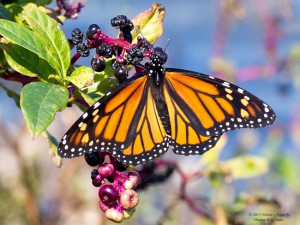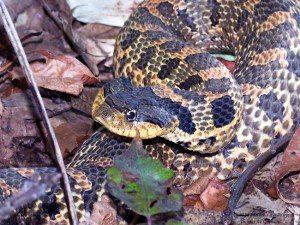New Jersey’s Species Status Review Process
HOW A SPECIES BECOMES LISTED AS “ENDANGERED” IN NEW JERSEY
By Michael Davenport, GIS Program Manager
How does the state’s Endangered and Nongame Species Program (ENSP) determine whether a species is imperiled or secure within the state? The process for determining a species’ state status is known as the “Delphi” method of species status review and it is a process which Conserve Wildlife Foundation of NJ (CWF) staff assists the state with.

The ENSP endeavors to complete a review of all species currently included on the Endangered and Nongame lists every 5-10 years. In addition, other species groups not currently included on those lists may be reviewed for status as well. At any given time, there may be several status reviews being conducted.
The first step taken in conducting a status review is to identify experts and invite them to participate as a member of a review panel. Members of the panel may be comprised of experts within academia, government agencies, non-profits, or private consultants as well as others.
Once a sufficient number of experts have agreed to participate, staff within the ENSP and CWF will compile background material for the species being reviewed. This may include reports, survey data, and data contained within the state’s Biotics database which is the electronic warehouse for all imperiled species data in New Jersey. This background data, as well as a list of the species being reviewed, and definitions of the status options, are then sent to the panelists for Round 1 of the review.
Delphi reviews are comprised of multiple “Rounds”. For each round, each panelist will choose a status for each species based upon that panelist’s expertise as well as the background material. The panelist then sends their selections and justification regarding each species to ENSP or CWF staff who compile the results submitted by all panelists. The review is completed anonymously, so the panelists do not know the identities of the other participants.

For each species, the panel must reach consensus of at least 85% of the respondents for a species’ status to be determined. If consensus is not reached during the first round, then that species will move on to be reviewed in Round 2. For each new round, the panelists’ status choices during the prior round, as well as all the comments made, are available to the panel, so that reviewers can consider the weight of evidence and other reviewers’ opinions on status as they prepare to vote again. This continues until consensus is reached for all species under review.
Once consensus is reached for all species or, if after four rounds have passed and consensus could not be reached for some species, ENSP or CWF staff will take the compiled Delphi results to the Endangered and Nongame Species Advisory Committee (ENSAC). ENSAC reviews the results and makes the final recommendations on status for those species for which consensus was not reached by the expert panel. Based upon ENSAC’s recommendations, any changes to the Endangered and Nongame lists must go through a formal rule-making process before those changes can be made official.
The Delphi review process is a science-based, anonymous review by those with the most expertise on the species within New Jersey. A great deal of thought and time go into preparing for and carrying out a review and CWF has played a major role in assisting with the process. From the blue whale to fairy shrimp, each species will ultimately receive a state status, leading the way for conservation action.
The following are state conservation status categories; the last, “Not Applicable”, is used only during the status review and is not a legal status category.
- Endangered
Applies to species whose prospects for survival within the state are in immediate danger due to one or several factors, such as loss or degradation of habitat, overexploitation, predation, competition, disease or environmental pollution, etc. An Endangered species likely requires immediate action to avoid extinction within New Jersey. - Threatened
Applies to species that may become Endangered if conditions surrounding it begin to or continue to deteriorate. Thus, a Threatened species is one that is already vulnerable as a result of small population size, restricted range, narrow habitat affinities, significant population decline, etc. - Special Concern
Applies to species that warrant special attention because of inherent vulnerability to environmental deterioration or habitat modification that would result in their becoming Threatened. This category would also be applied to species that meet the forgoing criteria and for which there is little understanding of their current population status in the state. - Secure/Stable
Applies to species that appear to be secure in New Jersey and not in danger of falling into any of the preceding three categories in the near future. - Undetermined/Unknown
Applies to a species that cannot be assigned a status of endangered, threatened, special concern or secure/stable because not enough information exists on which to base a judgment. - Not Applicable
Applies to species that do not occur in New Jersey, including occasional non-breeding strays and transient breeders that fail to persist.
Discover more from Conserve Wildlife Foundation of NJ
Subscribe to get the latest posts sent to your email.